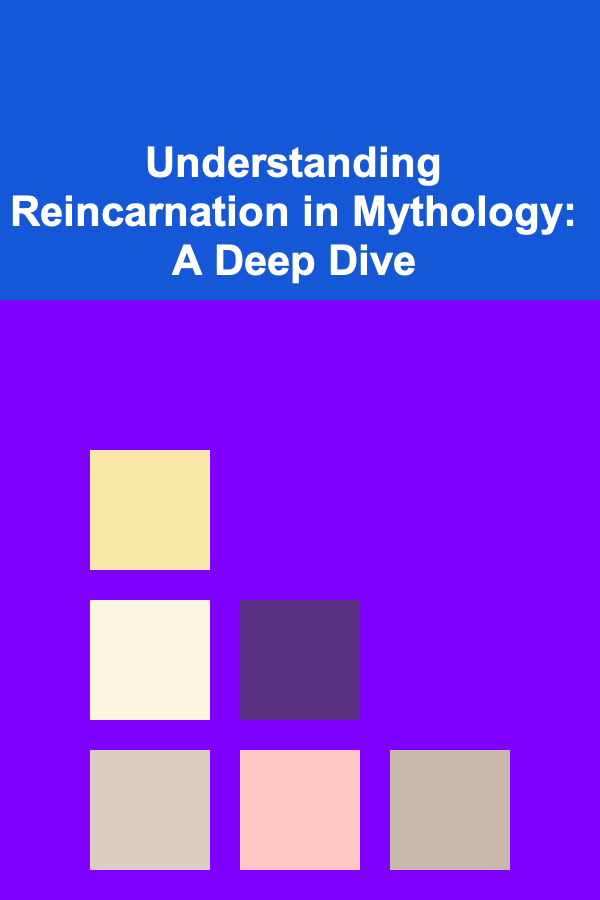
Understanding Reincarnation in Mythology: A Deep Dive
ebook include PDF & Audio bundle (Micro Guide)
$12.99$8.99
Limited Time Offer! Order within the next:

Introduction: The Enduring Allure of Rebirth
The concept of reincarnation, the belief that after death the soul or consciousness is reborn in a new body, is a pervasive and profound theme found across diverse cultures and mythologies throughout history. It's not merely a philosophical abstraction; it's a deeply embedded cultural narrative that addresses fundamental questions about life, death, justice, and the nature of reality. Understanding reincarnation within mythological contexts requires a nuanced approach, going beyond simplistic notions of cyclical existence and delving into the specific beliefs, values, and social structures that shape its expression within each culture.
This essay aims to explore the multifaceted nature of reincarnation as it appears in various mythological systems. We will examine key traditions such as Hinduism, Buddhism, Ancient Greece, and indigenous cultures, analyzing the core tenets of their respective reincarnation beliefs, the underlying reasons for their development, and the ways in which these beliefs impact ethical behavior, social hierarchies, and the overall worldview of the societies that embrace them.
Hinduism: The Wheel of Samsara and the Pursuit of Moksha
In Hinduism, reincarnation, known as Samsara, is a cornerstone of its cosmology and soteriology (the study of salvation). The soul, or Atman, is considered eternal and undergoes a continuous cycle of birth, death, and rebirth. This cycle is driven by Karma, the principle of cause and effect, where actions in one life determine the conditions of the next.
The quality of a rebirth in Hinduism depends on the accumulation of good and bad karma. A life lived virtuously, adhering to Dharma (righteous conduct), leads to a higher rebirth -- perhaps as a human in a favorable situation or even as a celestial being. Conversely, a life filled with negative actions results in a lower rebirth, potentially as an animal, a plant, or even in hellish realms. This karmic accounting provides a framework for understanding inequality and suffering in the world. It offers a justification for social hierarchies, with the assumption that individuals are born into their respective castes based on their past deeds.
However, the ultimate goal in Hinduism is not simply to achieve a better rebirth but to escape the cycle of Samsara altogether. This liberation, known as Moksha, is achieved through various spiritual paths, including Jnana Yoga (the path of knowledge), Bhakti Yoga (the path of devotion), Karma Yoga (the path of selfless action), and Raja Yoga (the path of meditation). Each path aims to realize the true nature of the Atman, which is ultimately identical to Brahman, the ultimate reality.
Hindu mythology is replete with stories illustrating the principles of Karma and Samsara. Tales of gods and goddesses incarnating on Earth to restore Dharma, such as the ten avatars of Vishnu, serve as powerful reminders of the cyclical nature of existence and the importance of righteous action. Furthermore, the stories of individuals striving for Moksha, often through arduous ascetic practices and profound self-realization, provide models for spiritual aspirants.
The Bhagavad Gita, a central text in Hinduism, elaborates on the concept of reincarnation in the context of duty and detachment. Krishna, an avatar of Vishnu, instructs Arjuna on the battlefield, emphasizing the importance of performing one's duty (Dharma) without attachment to the fruits of action. This teaching underscores the idea that actions performed with selfless intent do not generate negative karma and contribute to the eventual attainment of Moksha.
Buddhism: Dependent Origination and the Cessation of Suffering
Buddhism, while sharing some common ground with Hinduism regarding reincarnation, presents a distinct perspective. Instead of an eternal Atman, Buddhism emphasizes the concept of Anatta, or "no-self." This does not mean that nothing continues after death, but rather that there is no permanent, unchanging soul that transmigrates from one life to the next.
Instead of a soul, Buddhism posits a stream of consciousness that continues after death, driven by Karma and the principle of Dependent Origination. Dependent Origination describes how all phenomena arise in dependence upon other phenomena. The twelve links of Dependent Origination illustrate how ignorance, desire, and aversion perpetuate the cycle of rebirth. These links include ignorance, volitional actions, consciousness, name and form (mind and body), the six senses, contact, feeling, craving, clinging, becoming, birth, aging, and death.
The goal in Buddhism is not simply to achieve a better rebirth, but to eliminate suffering and attain Nirvana, a state of liberation from the cycle of rebirth. This is achieved through the practice of the Eightfold Path, which consists of Right Understanding, Right Thought, Right Speech, Right Action, Right Livelihood, Right Effort, Right Mindfulness, and Right Concentration. By cultivating wisdom, ethical conduct, and mental discipline, practitioners can gradually weaken the bonds of craving and aversion that perpetuate Samsara.
Unlike Hinduism, Buddhism does not generally endorse the idea of a fixed social hierarchy based on past karma. While acknowledging the consequences of actions, Buddhism emphasizes the potential for all beings to attain enlightenment, regardless of their social status or past deeds. The focus is on individual effort and the cultivation of compassion and wisdom.
Buddhist mythology includes stories of the Buddha's past lives, known as the Jataka tales. These stories illustrate the virtues of compassion, generosity, patience, and wisdom, which the Buddha cultivated over countless lifetimes. They serve as examples for practitioners and demonstrate the gradual path to enlightenment.
The concept of Bodhisattvas, beings who postpone their own Nirvana to help others achieve enlightenment, is also central to Buddhist mythology. Bodhisattvas embody the ideal of selfless compassion and dedicate their lives to alleviating the suffering of all beings. They are seen as actively working to guide others along the path to liberation, often taking rebirth in various forms to offer assistance and teachings.
Ancient Greece: Metempsychosis and the Orphic Mysteries
While not as central to Greek religion as it is in Hinduism and Buddhism, the idea of reincarnation, known as Metempsychosis (the transmigration of souls), appears in various philosophical and religious traditions in Ancient Greece. Notable figures such as Pythagoras, Empedocles, and Plato espoused beliefs in the cyclical nature of existence and the possibility of the soul being reborn in different bodies, both human and animal.
Pythagoras, for example, is said to have remembered his past lives and believed that all living beings were related through the shared experience of reincarnation. Empedocles believed that the soul could be purified through living a virtuous life and abstaining from certain foods. He described a cosmic cycle of love and strife, where souls were alternately drawn together and separated, leading to different forms of embodiment.
Plato's writings, particularly in the dialogues Phaedo, Republic, and Meno, explore the concept of reincarnation in detail. He argued for the immortality of the soul and its pre-existence, suggesting that learning is actually a process of recollection of knowledge that the soul possessed in a previous life. In the myth of Er in the Republic, Plato describes the journey of souls after death and their choice of a new life, based on their experiences and desires. This choice, however, is often made unwisely, leading to repeated cycles of suffering.
The Orphic Mysteries, a religious movement that emerged in Ancient Greece, also emphasized the concept of reincarnation and the possibility of achieving liberation from the cycle of rebirth. Orphic mythology tells the story of Dionysus, a god who was torn apart and resurrected, symbolizing the cyclical nature of life and death. Initiates into the Orphic Mysteries underwent rituals and practices aimed at purifying the soul and ensuring a favorable rebirth.
Unlike the Eastern traditions of Hinduism and Buddhism, the Greek concept of reincarnation often lacked a detailed system of karmic accounting. While virtue was generally believed to lead to a better rebirth, the specific mechanisms and consequences of actions were less clearly defined. The emphasis was more on the inherent nature of the soul and its potential for purification and liberation.
The influence of Greek philosophy and the Orphic Mysteries extended beyond Ancient Greece, influencing various Gnostic and Hermetic traditions that also incorporated the idea of reincarnation into their cosmological and soteriological frameworks.
Reincarnation in Indigenous Cultures: Animism and Ancestral Connection
The concept of reincarnation is not limited to Eastern and Western philosophical and religious traditions. Many indigenous cultures around the world also hold beliefs in the cyclical nature of existence and the rebirth of souls or spirits. These beliefs are often intertwined with animistic worldviews, where all things -- including animals, plants, and even inanimate objects -- are believed to possess a soul or spirit.
In many indigenous cultures, reincarnation is not necessarily seen as a linear progression from one life to the next, but rather as a continuous cycle of interaction between the living and the dead. Ancestors are often believed to remain connected to their descendants, influencing their lives and offering guidance and protection. The spirits of the dead may be reborn within the same family or community, carrying on their lineage and traditions.
For example, in some Native American cultures, it is believed that the spirits of ancestors can be reborn as children within the tribe. The naming ceremonies often involve consulting with elders or shamans to determine which ancestor is returning in the newborn. This belief reinforces the connection between generations and the importance of honoring ancestral traditions.
In some African cultures, the concept of Abiku refers to children who are believed to be born to die repeatedly. These children are seen as spirits who are reluctant to stay in the world of the living and are constantly drawn back to the realm of the dead. Special rituals and precautions are often taken to prevent Abiku children from dying and to encourage them to remain with their families.
Australian Aboriginal cultures also have diverse beliefs about reincarnation, often involving the concept of the Dreamtime, a primordial realm where the spirits of ancestors reside. These spirits can be reborn as animals, plants, or humans, maintaining a continuous connection to the land and the ancestral traditions.
The specific details of reincarnation beliefs vary widely among indigenous cultures, but they often share common themes, such as the importance of ancestral connection, the cyclical nature of existence, and the interconnectedness of all living things. These beliefs provide a framework for understanding the relationship between the living and the dead, the importance of honoring the past, and the responsibility to care for the environment.
Mythological Functions of Reincarnation: Meaning, Morality, and Social Order
The prevalence of reincarnation beliefs across diverse cultures suggests that it serves several important mythological functions. These functions extend beyond simply explaining the phenomenon of death and rebirth and contribute to the overall meaning, morality, and social order of the societies that embrace them.
1. Providing Meaning and Purpose:
Reincarnation offers a framework for understanding the seemingly random and chaotic nature of life. It suggests that there is a deeper purpose to existence, that our lives are not simply isolated events but are part of a larger cosmic drama. The belief that our actions have consequences that extend beyond our current lifetime provides a sense of meaning and encourages us to live more consciously and ethically.
2. Reinforcing Moral Behavior:
The principle of Karma, often associated with reincarnation beliefs, provides a powerful incentive for moral behavior. The idea that our actions will determine the conditions of our future lives encourages us to act with compassion, kindness, and integrity. The fear of negative consequences in future rebirths can serve as a deterrent against harmful or unethical behavior.
3. Explaining Inequality and Suffering:
Reincarnation offers a way to explain the apparent injustices and inequalities in the world. The belief that individuals are born into different circumstances based on their past karma can provide a justification for social hierarchies and the distribution of wealth and resources. While this explanation can be used to perpetuate inequality, it can also offer a sense of acceptance and resignation in the face of suffering.
4. Maintaining Social Order:
In some societies, reincarnation beliefs have been used to reinforce social order and maintain the status quo. The caste system in Hinduism, for example, has been justified by the belief that individuals are born into their respective castes based on their past karma. This belief can discourage social mobility and reinforce traditional social roles and responsibilities.
5. Connecting Generations:
Reincarnation beliefs, particularly in indigenous cultures, often reinforce the connection between generations and the importance of honoring ancestral traditions. The belief that ancestors can be reborn within the family or community strengthens the bonds between the living and the dead and encourages the transmission of cultural knowledge and values.
6. Offering Hope and Consolation:
Reincarnation offers hope and consolation in the face of death. The belief that death is not the end but simply a transition to a new life can alleviate the fear and grief associated with loss. It provides a sense of continuity and suggests that our loved ones will eventually return in some form.
Critical Perspectives and Challenges to Reincarnation Beliefs
While reincarnation beliefs offer comfort, meaning, and moral guidance to many, they are not without their critics and challenges. Skeptics often question the lack of empirical evidence for reincarnation and point to alternative explanations for phenomena such as near-death experiences and past-life memories.
1. Lack of Empirical Evidence:
One of the main criticisms of reincarnation is the lack of verifiable scientific evidence. While some researchers have investigated cases of individuals who claim to remember past lives, these claims are often difficult to verify and can be attributed to other factors such as suggestion, fantasy, or cryptomnesia (unconscious memory).
2. The Problem of Overpopulation:
Some critics argue that the concept of reincarnation is incompatible with the increasing human population. If all souls are constantly being reborn, where are the new souls coming from? This argument assumes a fixed number of souls, which may not be a necessary component of all reincarnation beliefs.
3. Justification of Inequality:
As mentioned earlier, reincarnation beliefs can be used to justify social inequality and maintain the status quo. The idea that individuals are born into different circumstances based on their past karma can be used to rationalize poverty, oppression, and discrimination. This raises ethical concerns about the potential for reincarnation beliefs to perpetuate injustice.
4. The Nature of Identity:
The concept of reincarnation raises questions about the nature of identity. If the soul or consciousness is constantly being reborn in different bodies, what constitutes the individual? Is there a continuous thread of identity that connects all these different lives? These are complex philosophical questions with no easy answers.
5. Cultural Appropriation:
In recent years, there have been concerns about the cultural appropriation of reincarnation beliefs, particularly by Westerners who may not fully understand the nuances and complexities of these traditions. It is important to approach reincarnation beliefs with respect and sensitivity, avoiding superficial or disrespectful interpretations.
Conclusion: Reincarnation as a Timeless Archetype
Despite the challenges and criticisms, the concept of reincarnation continues to resonate with people across cultures and throughout history. It represents a fundamental human desire to understand the mysteries of life and death, to find meaning and purpose in existence, and to believe that there is something beyond the limitations of our mortal lives.
Whether viewed as a literal truth or a metaphorical representation of the cyclical nature of existence, reincarnation serves as a powerful archetype that speaks to our deepest fears and hopes. It offers a framework for understanding the interconnectedness of all things, the consequences of our actions, and the potential for growth and transformation.
By studying the diverse expressions of reincarnation in mythology, we can gain a deeper appreciation for the richness and complexity of human thought and the enduring quest to understand our place in the universe. It allows us to examine how different cultures grapple with fundamental questions of existence and develop frameworks for living a meaningful and ethical life. Ultimately, understanding reincarnation in mythology is not just about understanding the belief itself, but about understanding the human condition and the timeless search for meaning and purpose.

Financial Freedom: A Financial Advisor's Roadmap to Client Success
Read More
Software Architect's Toolkit: Essential Tools and Techniques for Creating Robust Systems
Read More
How To Pair Wine with Breakfast Dishes
Read More
How To Analyze the Motives Behind Conspiracy Theory Creation
Read More
10 Tips for Watching Foreign Films and Expanding Your Horizons
Read More
10 Tips for Saving Money on Organic Groceries: A Budget Checklist
Read MoreOther Products

Financial Freedom: A Financial Advisor's Roadmap to Client Success
Read More
Software Architect's Toolkit: Essential Tools and Techniques for Creating Robust Systems
Read More
How To Pair Wine with Breakfast Dishes
Read More
How To Analyze the Motives Behind Conspiracy Theory Creation
Read More
10 Tips for Watching Foreign Films and Expanding Your Horizons
Read More